Vaccine Wars
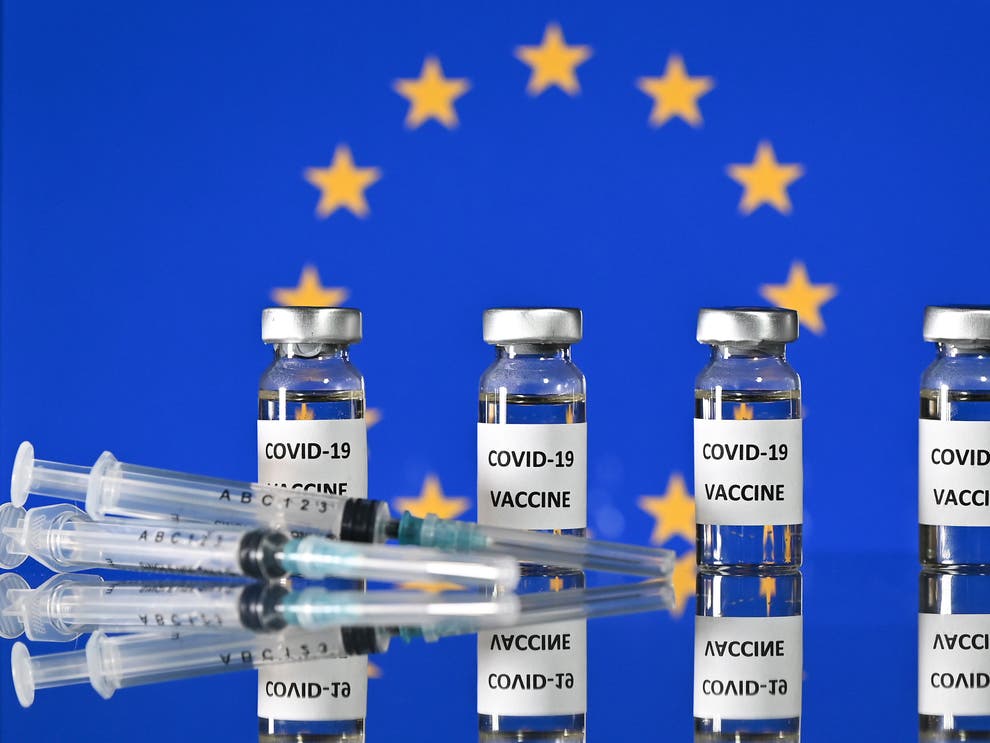
In a huge escalation of the vaccine row, the European Commission invoked Article 16 of the Northern Ireland Protocol in the Brexit deal yesterday in a bid to prevent the region becoming a backdoor for EU vaccines to be sent to the wider UK. This would effectively have created a hard border between Northern Ireland and its southern neighbour, but after furious criticism from the British, Northern Irish and Irish governments, it quickly backed down. The Mail has more.
The EU sensationally backed down last night over its plans to impose Covid vaccine controls on the Northern Ireland border after the proposals were met with a strong and united backlash from UK and Irish politicians.
EU chiefs had been accused of an “incredible act of hostility” after announcing controls on the export of jabs to the UK, including Northern Ireland.
In a move which would have effectively created a ‘hard border’ on the island of Ireland, EU officials had planned to override part of the Brexit trade agreement and demand checks of vaccines flowing from Europe into Northern Ireland.
Ireland’s Taoiseach Micheal Martin raised objections to EU leaders, while Michel Barnier, who was the EU’s chief Brexit negotiator, said he was calling for “co-operation” over vaccines between the UK and Brussels.
And in another strongly-worded statement, Boris Johnson last night said he had “grave concerns” over the proposals and demanded the EU “urgently clarify its intentions”.
But in a major climb-down, hours after announcing the proposals, bloc leaders quickly reversed the decision and say they will now no longer go ahead with the controls.
In a statement released late last night, the European Commission said: “To tackle the current lack of transparency of vaccine exports outside the EU, the Commission is putting in place a measure requiring that such exports are subject to an authorisation by Member States.
“In the process of finalisation of this measure, the Commission will ensure that the Ireland/Northern Ireland Protocol is unaffected. The Commission is not triggering the safeguard clause.
“Should transits of vaccines and active substances toward third countries be abused to circumvent the effects of the authorisation system, the EU will consider using all the instruments at its disposal.
“In the process of finalising the document, the commission will also be fine-tuning the decision-making process under the implementing regulation.”
Worth reading in full.
Stop Press: Read Ambrose Evan Pritchard’s report in Telegraph on the prospect of the EU invoking Article 122 against Astra Zeneca, paving the way for seizure of its intellectual property and data, and arguably taking control of its production as well.
Stop Press 2: Meanwhile, Macron has backed claims that the AstraZeneca vaccine is ineffective for the over-65s. Which begs the question, why is he so desperate to get hold of it?
Technical Issue
As some Lockdown Sceptics readers will be aware, we’ve been having a bit of trouble sending our daily newsletters to some of our email subscribers. This issue relates only to @mac.com, @iCloud.com and @me.com addresses, all of which are run by Apple Inc. We’re trying hard to resolve this, but if anyone affected by this is missing our morning newsletter and would like to keep receiving it in the meantime, please re-subscribe to our newsletter using an alternative email address. Incidentally, if you no longer wish to subscribe please notify Ian Rons that you wish to be removed from the mailing list. Don’t mark the emails as “junk”.
More Fines and More Invasions of Privacy

Yesterday, without much in the way of reporting, new coronavirus regulations came into force. PA media has the details.
Fines of £800 for people caught at house parties and fresh powers to share data with police on those who should be self-isolating have become law in England.
The latest coronavirus regulations came into force at 5pm on Friday as part of tougher measures to crack down on illegal gatherings and those flouting the legal requirement to self-isolate during the pandemic.
The house party penalty will apply to groups of more than 15 people and will double after each offence, up to a maximum of £6,400 for repeat offenders.
This supersedes existing fines of £200.
But the £10,000 penalties for unlawful groups of more than 30 people will still only apply to the organiser.
According to the legislation, called the Health Protection (Coronavirus, Restrictions) (All Tiers and Self-Isolation) (England) (Amendment) Regulations 2021, the £800 fine is cut to £400 if paid within 14 days…
Police are given extra powers to access Test and Trace data under the new law.
It comes after data published by the National Police Chiefs’ Council (NPCC) on Thursday showed just 332 fines had been issued by forces in England and three in Wales, to people failing to self-isolate after arriving from a country on the Government quarantine list between September 28th and January 17th.
The latest laws, signed off by Health Secretary Matt Hancock, amend self-isolation regulations “to correct a number of errors” in previous versions of the legislation and “update the information which may be shared for the purposes of carrying out functions under the regulations, or preventing danger to the health of the public from the spread of coronavirus, and to allow certain information to be shared only where necessary for specified law enforcement purposes”.
Contact details, including a phone number and email address where available, can be shared if someone tests positive for coronavirus or if a person has come into close contact with a positive case, the laws state.
Last year, it emerged people in England who had been told to self-isolate through NHS Test and Trace could have their details shared with police on a case-by-case basis after the Government updated its guidance.
But police would not have access to data from the NHS COVID-19 app, which is anonymous so the Government does not know who has been sent instructions to self-isolate.
Worth reading in full.
Adam Wagner, the human rights lawyer who’s an authority on Coronavirus regulations, has a useful thread on this, detailing both the new rules and the important human rights issues that they raise:
Big Brother Watch is also concerned about the new regulations:
Stop Press: openDemocracy is reporting that some 1,500 Met Police officers have, on the quiet, been ordered to switch off the NHS COVID-19 tracing app while at work. This appears to be aimed at reducing the number of officers having to self-isolate.
Did ‘Eat Out to Help Out’ Increase Covid Infections?

Yesterday brought further confirmation that the Treasury is the most sceptical of the Whitehall departments after it issued a stout defence of the Eat Out to Help Out scheme. This followed heavy criticism of the scheme in the wake of the winter surge in Covid infections. The Sun was first to the story.
Rishi Sunak has launched a full throated defence of his flagship Eat Out to Help Out scheme after data showed no link to rising Covid cases.
The incredibly popular £849 million scheme launched last August to keep the hospitality industry afloat has come under fire in light of the deadly second wave.
More than 160 million punters were given 50% off meals to try to get people back into struggling pubs and restaurants, with the scheme credited for getting 400,000 workers off furlough.
Now data published by the Treasury shows areas with the high take up of the scheme also still had low virus levels between August and October.
The figures show places such as Westminster and Scarborough and North Devon had very high take-up of Eat Out to Help Out, but very low subsequent Covid cases.
Meanwhile Knowsley, Rochdale and Merthyr Tydfil had far higher Covid rates, but lower levels of use of the scheme.
The Treasury said: “These figures confirm that take-up of Eat Out to Help Out does not correlate with incidence of Covid regionally – and indeed where it does the relationship is negative.”
A spokesman said: “As we have done throughout the pandemic, we have worked with creativity and at pace to support individuals and businesses.
“We designed The Eat Out to Help Out scheme to protect two million jobs in hospitality, an industry whose employees are at high risk of long-term unemployment in the event of redundancy.
“It protected jobs across the UK by bringing back 400,000 people from furlough while safely restoring consumer confidence.”
The Treasury is obviously right about this. Last week Parliament was reminded that hospitality is not a huge risk when it comes to infection. The Caterer reports:
Greg Fell, Director of Public Health at Sheffield County Council, and Richard Harling, Director of Health and Care at Staffordshire County Council, appeared before Parliament’s Science and Technology Committee yesterday [27th January].
When asked about whether hospitality was a vector for infections, the pair said the spread mainly occurred in people’s homes.
Fell said: “Most of the transmission events are within households and household to household.
“Hospitality doesn’t crop up as a terribly big risk on our radar. When we look at the common exposure data set hospitality isn’t a huge risk.
“There will have been transmission events within hospitality, but it’s certainly nowhere near the top of my risk radar.”
Harling added: “Back in the summer and autumn, once you put transmission between household members aside, the next most important one was transmission between different households.
“The hospitality sector did feature, but much lower down the list. At the moment, with the hospitality sector closed, the main [cause of spread] is other businesses and workplaces.”
A Smidgen of Pessimism on Masks

Today we have another contribution from Dr Rachel Mann, written in response to the “A Smidgen of Optimism on Masks” which we published last Sunday.
Having mulled over Steve Sieff’s interesting take on masks in the January 24th Lockdown Sceptics newsletter, I wondered whether to just bury my head in a box of face masks and accept the joyless existence of a world where the divisive impacts of masks are considered completely normal, or respond. As an arch sceptic of mask wearing, I couldn’t help but choose the latter of course.
The central theme of the “Smidgen of Optimism” piece was to think about a dial down of the mask debate in terms of ‘just the science’ and focus on mask wearing as a choice, based on an individuals’ own concept of their risk. This seems highly logical and completely sensible to me and would that we might have had that option last year. Instead of a mask mandate, allow individuals to assess their own risk and choose to wear a mask or not. Simple! Or is it?
We were never given that choice, to assess our own risk, nor are we likely to be in the distant future. The mask mandate was brought in last year with absolutely no thought or clear messaging as to how this so called ‘public health intervention’ should be managed. Consequently, the psyche of mask wearing has become shaped and warped by a popular opinion war as to what is right or wrong and polarised discourse.
I fear that we have gone past the point of no return in some ways because the concept of, as Steve himself says, “Those who do not wear a mask are letting down others and are stigmatised” has been, and is, occurring on a daily basis and I see no reason for it to change or that “More protective masks such as N95s and N99s could change this narrative”. So, parking the science about the (inconclusive) effectiveness of masks for one moment, I thought I’d briefly muse over a few issues that seem relevant to the divisive nature of masks:
1. Masking ‘Care’: We are already at a point where those admitting to vaccine hesitancy or outright refusal for whatever personal reasons to take the COVID-19 vaccine are being singled out as not worthy of receiving health care treatment for COVID-19 from the NHS. If choosing to mask up became a free choice, and that choice is the best possible protection (N95 or N99 mask) rather than a mandate, the use of a mask still continues to perpetuate the message a particular person choosing to wear the mask is stating to the outside world “I am responsible, I care about my health and the NHS is important to me”. Those who don’t mask up will still be stigmatised whether it is under mandate or a choice; choosing not to wear a mask has become and will remain entrenched in negative opinion as irresponsible, uncaring and selfish behaviour. As with the popular “no vax, no Covid treatment” opinion being embraced, those engaging in perceived negative behaviour of non-mask wearing will potentially be deemed not worthy of receiving health care for COVID-19, or maybe all respiratory viruses, or maybe even all conditions? The refrain of “you didn’t wear a mask to protect yourself from respiratory disease, so your partial knee replacement will be delayed until you mask up and protect your health first” is not really too dissimilar to denying people treatment who smoke or are overweight, is it?
2. Masking Affordability: The mantra of “we are all in it together” and that SARS-CoV-2 and “COVID-19 does not discriminate” is a myth; they are not socially neutral entities.
People living in more socio-economically disadvantaged neighbourhoods and minority ethnic groups have higher rates of almost all of the known underlying clinical risk factors that increase the severity and mortality of COVID-19, including hypertension, diabetes, asthma, chronic obstructive pulmonary disease (COPD), heart disease, liver disease, renal disease, cancer, cardiovascular disease, obesity and smoking”
The COVID-19 Pandemic and Health Inequalities, NIH
Yet, interestingly how do those people considered the most at risk of severe COVID-19, who are the most socio-economically disadvantaged in our population afford to pay for N95 and N99 masks? A very quick scout around Amazon revealed prices range for N95 mask from a single mask priced £6 to a box of 30 priced £56, and a box of five N99 masks for £50. The personal financial burden to hard-put working people would be immense and it’s likely that the most vulnerable would not wear masks due to eye watering unaffordable prices. If it’s food and rent needed, I think people would likely favour those choices over purchasing face masks. Or choose sub optimal masks due to costs and take the risk. What is the answer? State funded face masks, that are means tested and provided by the taxpayer? Another potentially divisive action perhaps as a mask wearer is then defined as someone on a lower income? Or equally someone who can comfortably afford an N95 and N99 mask is perceived as taking mask supplies from those who really need them?
3. Masking the Big “E” – “Environment”: In an age where we purport to be concerned about the environment it is quite astonishing that there is so much support for wearing face masks of the surgical, N95 and N99 variety; an item that is classed as ‘disposable’ but is in fact a non-biodegradable, one-wear item containing micro plastics. We care so much about our environment it seems that we are happy to send 1.6 billion ‘disposable’ face masks to landfill every month. If choice based masking becomes the ‘go to option’ this will inevitably contribute hugely to our future woeful landfill statistics. Or if we care about our drinking water supply and oceans, how about the recent studies that have investigated whether surgical face masks and N95 masks could be a source of microplastic pollutants in the environment? The results strongly suggested that masks act as a potential source of microfibers when they are released into the environment, adding additional burden to current microplastic pollution. Therefore, does a disposable N95 or N99, or whatever affordable masks one can buy, mean that you do not care about the environment and that you are putting your own selfish needs first? Does the need to protect yourself with a non-biodegradable mask rank above the needs of our global environment, our precious ecosystem, and the collective need to nurture and sustain our planet for our future generations? Are those who dispose of ‘disposable’ face masks, whatever their filtration properties to be labelled as “environmental safeguarding deniers”?
In conclusion, I fear that whatever the future of face mask wearing, it will remain a divisive issue for some time to come, as indeed all labelling does, whether it is masks, exemption badges or green and red bands (I note the green band – red band home page shows banders of both colours wearing masks). Which incidentally makes me wonder about how those who would choose to wear a green band and no mask would be perceived by others? We seem intent on overtly identifying individual’s personal choices and beliefs. Perhaps we have entered an age of ‘unmasking’ personal health beliefs where one must wear one’s health beliefs on one’s sleeve, face or neck. Looking back to 20th century history I don’t feel that bodes well…
Does Charging Travellers for Enforced Hotel Stays Violate WHO Rules?
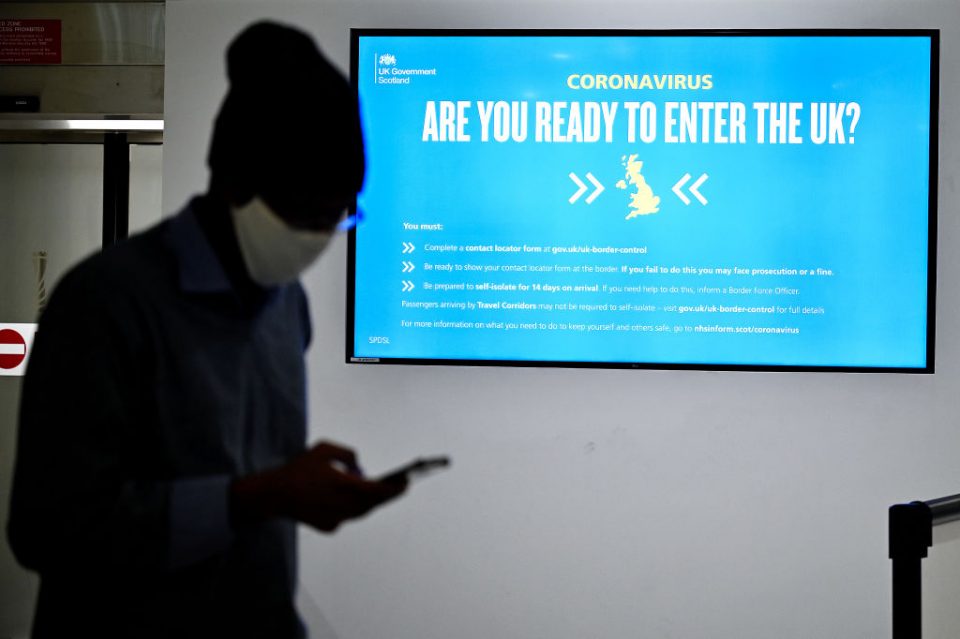
In the January 26th newsletter, we published a comment from a reader who had been looking at the WHO’s International Health Regulations and found that it might be against the rules to charge travellers for their period in mandatory quarantine. Today we have a response from Dr David McGrogan, an Associate Professor of Law at Northumbria Law School and a previous contributor.
Sadly, while the answer to this question may very well be “yes”, it has to be followed by an immediate “but”: this is highly unlikely to matter. The International Health Regulations are a treaty, which means obligations in it are binding on States which are party to it (which is all, or almost all, of them). But individuals would have no standing before any international court or tribunal to bring a claim for a violation. Only another State could do that. Why would one State sue another for charging people for using a quarantine hotel in violation of the International Health Regulations? (Particularly as they are all likely to be doing it soon if they aren’t already.)
The only other remotely realistic alternative would be for the WHO itself to raise the matter with the WHO’s World Health Assembly, but since the World Health Assembly is simply a body comprising representatives of the governments of the states who are members of the WHO, this would be very unlikely to bear fruit for obvious reasons.
There would be no prospect of a claim succeeding before a UK court, either. The UK has what is called a “dualist” system, which basically means that it treats international law as separate to domestic law. The UK government can sign whatever treaties it wants, more or less (although the first Gina Miller ‘Brexit’ case made clear that this power is not untrammelled), but they do not become ‘law’ at a domestic level until there has been an Act of Parliament making it so. And this means that our courts cannot enforce them without such an Act. This is the reason why, for example, the Human Rights Act 1998 was necessary in order to give UK courts the capacity to hear claims regarding violations of European Convention rights. It ‘brought rights home’ by in effect making them part of UK law. Since the International Health Regulations have not had a similar piece of legislation to make them part of our law, they are largely irrelevant as a matter for our courts.
At best, international legal obligations of the kind found in a treaty like the International Health Regulations can be said to have a ‘hortatory’ function – violation will have no legal effect but might shame a government to change its policy. International lawyers often claim that this is important. One can make up one’s own mind about that, of course.
Stop Press: The UK Government has placed travel bans on 33 high-risk countries. Travellers who set foot in any of the countries on the list, even in transit, will not be allowed into the UK.
British and Irish Nationals and third country nationals with the right of residence in the UK will be allowed in but will need to quarantine for 10 days upon arrival. Further details of the policy, including whether or not those in quarantine will have to pay for he privilege, will be set out next week.
Stop Press 2: Worth noting that the UK would not be the first to charge for quarantine. Australia, whose borders are closed to nearly everybody, even New Zealand at the moment, has been charging returning nationals and residents $3,000 dollars for a mandatory 14 day quarantine for months now.
The Adults are Having a Quite Different Conversation
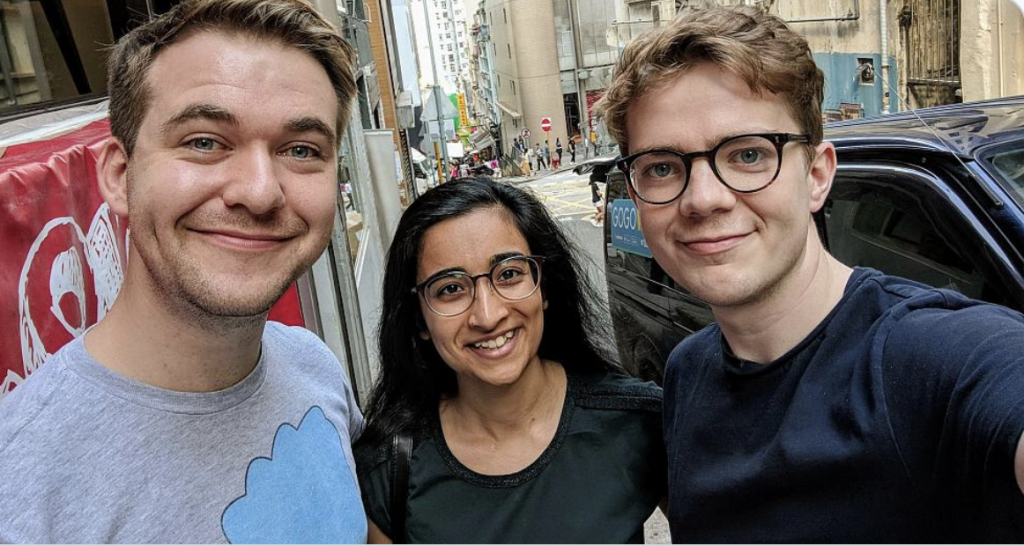
Today we’re publishing a new response to Sam Bowman’s anti-lockdown sceptics article in the New Statesman last week. The response is by Timon Wapenaar, a violinist based in Spain. It’s a scorcher. Here’s an extract.
A piece in the New Statesman by Sam Bowman which ostensibly aims to debunk the “eight biggest Covid-sceptic myths” presents us with a pot-pourri of Twitter-troll inspired overripe low hanging fruit. No serious lockdown critic has ever framed the argument in the way Bowman represents it. Has Sunetra Gupta ever said that “we are overreacting to a virus which 99.5% of people will survive”? I doubt it. A Google search for “Sunetra Gupta” and the exact phrase “we are overreacting” yields Bowman’s own article as the first hit, and only five other hits in total, none of which contained the damning quote.
Likewise, there is not one lockdown sceptic of stature who says that “we aren’t seeing excess deaths”, or that “we’re witnessing a ‘casedemic’ of false positives from doing too many tests”. While there are assertions made about both excess deaths and a ‘casedemic’, their nature is much, much more nuanced than Bowman would have us believe. Indeed, his phrasing of the ‘casedemic’ is absolutely absurd. How on earth could any opponent worth arguing with believe something as patently stupid as “more tests result in more false positives”? He obviously hasn’t read or listened to Heneghan, or Jefferson, or Yeadon, or McKernan. Or Levitt, or Gupta, or Bhattacharya, or Kulldorff, or Sikora.
It is mala praxis to choose the worst possible version of your opponent’s argument, and yet this is what Bowman does. The refutations he offers might be useful for dunking on your brother-in-law at a family dinner, or vanquishing that Twitter troll with a hundred followers, but fall hopelessly short of being a contribution to any real argument over the efficacy of lockdowns.
If he’d been more courageous, Bowman would have addressed the most important question posed by sceptics: are state-mandated NPIs (non-pharmaceutical interventions) sufficiently effective to justify the significant harms they entail? That they reduce transmission to some degree (which they do, in all likelihood) is not sufficient. The gains must outweigh the price paid by society. Bowman instead chooses to focus only on whether lockdowns reduce transmission. This is disappointing: if the holistic effectiveness of the most restrictive lockdown measures can be proven, all other arguments become somewhat ancillary.
Worth reading in full.
In Defence of Sir Desmond Swayne

There follows a post by Will Jones.
Lockdown sceptic firebrand Sir Desmond Swayne MP has come under intense criticism following the surfacing of an interview he did with Save Our Rights UK back in November.
According to Sky News, in the interview the former minister said:
It seems to be a manageable risk, particularly as figures have been manipulated… We’re told there is a deathly, deadly pandemic proceeding at the moment. That is difficult to reconcile with ICUs (intensive care units) actually operating at typical occupation levels for the time of year and us bouncing round at the typical level of deaths for the time of year.
He also told the group, which appears to be a broad tent that includes supporters of some of the wilder conspiracy theories, to “persist” in their anti-lockdown campaign, adding: “And I’ll persist too.”
His comments have been roundly condemned and the Labour Party has called for him to have the Conservative whip removed, though there’s no indication that will happen.
Michael Gove said: “I would hope that he issues a full and complete retraction and apology for what he said – it’s unacceptable.”
Boris Johnson’s spokesman said the Prime Minister agreed with Gove, though awkwardly when asked about it during his trip to Scotland, Boris replied: “I’m sorry I haven’t seen that.”
Home Secretary Priti Patel said: “Those comments are thoroughly wrong and I very much hope Desmond will reflect and take those comments back.”
The Whips’ Office said: “We completely condemn these comments. It is on all of us to work together to control the virus to protect the NHS and save lives.”
It is reported that Conservative chief whip Mark Spencer spoke to Sir Desmond and asked him to attend a meeting with scientific advisers – which Sir Desmond has happily agreed to do. Oh, to be a fly on the wall…
Angela Rayner, the Deputy Leader of the Labour party, wrote to the chair of the Conservative Party Amanda Milling alleging that Swayne “endorsed conspiracy theories about the veracity of the disease” – seemingly a reference to his claim that “figures have been manipulated”.
She laid it on thick: “The seriousness of his actions cannot be understated. For a member of parliament to appear on this platform and undermine our fight against the pandemic could have truly devastating consequences.”
The criticisms of Sir Desmond (at least, the ones that aren’t based on guilt-by-association) boil down to arguing that 1) there is no evidence that data has been “manipulated” and 2) that at the time of his comments, deaths were not “typical” for the time of year.
It is notable that no attempt has been made to dispute his claim about ICUs in November operating at “typical occupation levels for the time of year”, since that is demonstrably true, as this graph comparing 2020 with 2017 shows. This was not the impression many in Government and the media were giving at the time, with claims that daily “Covid admissions” were running at around 1,500 a day – which they were, but that wasn’t unusual – being made to whip up fear and used to justify increasing restrictions. This, presumably, is what Swayne means by “manipulation” of figures. That and the infamous prediction of 4,000 deaths a day made by Witless and Unbalanced in October to bounce the Government into the second lockdown. I think it’s fair to describe those figures as having been “manipulated”. After all, it was that prediction which prompted the UK statistics watchdog to issue another warning to the Government on its confusing and opaque use of statistics.
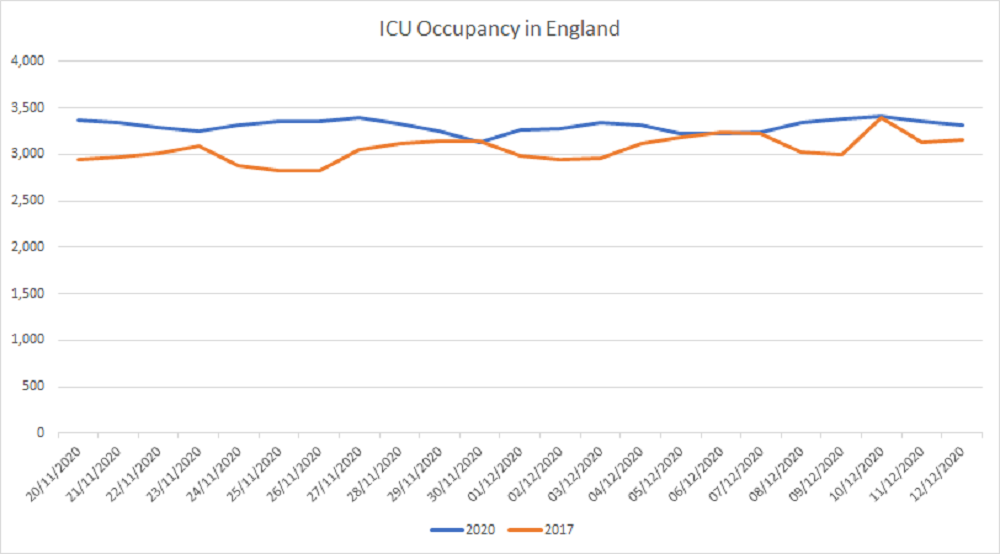
In terms of deaths, while November did see a greater number of weekly deaths than the average for the last five years, it was not hugely elevated and the trend was largely flat or declining. Describing this as “bouncing round at the typical level of deaths for the time of year” seems a fair description.
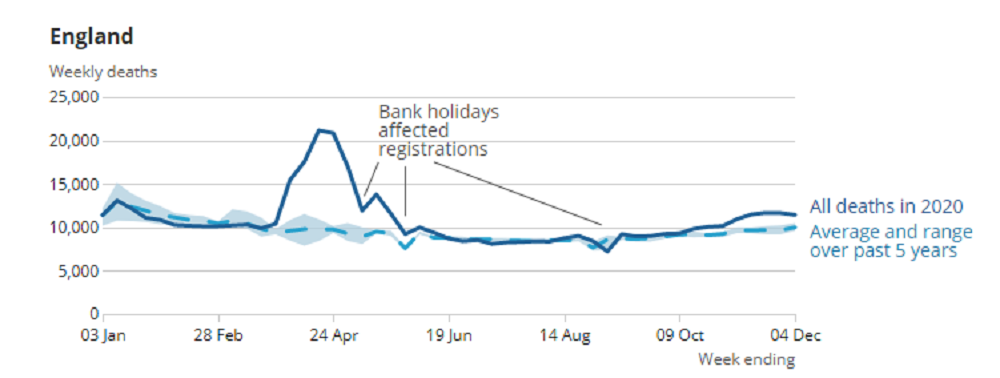
Sir Desmond defended his comments this week, saying they were “legitimate at the time”.
He is right to stand his ground. It must be acceptable for MPs, like journalists and other members of the public, to challenge Government policy, particularly during a crisis when momentous, far-reaching decisions are being made. Hindsight must not be used as a weapon to attack critics of the Government. Everyone has made some poor predictions in this crisis, Government ministers and advisers included. That’s not a reason for punishing dissenters from Covid orthodoxy in order to silence them. Any moves in that direction must be stoutly resisted.
Lockdown Sceptics win Cambridge Union Debate by 362 Votes to 309
On Thursday evening, Toby took part in a Cambridge Union debate. The motion was: “This House believes lockdown was a mistake.” Toby spoke in support of the motion along with Richard Tice and Sir Graham Brady MP. Writer, novelist and journalist Laura Spinney, novelist and physician Phil Whitaker and Liberal Democrat MP Layla Moran spoke against. The motion was approved by 362 votes to 309. The Cambridge Independent has more.
Getting the proceedings under way was Sir Graham Brady, who said that the Lancet medical journal reported on December 23rd that, looking at the second lockdown, “it remains unclear how effective tier restrictions were in reducing transmission and what additional reduction in transmission might have been accomplished by the second lockdown”.
“We can see the efficacy of lockdowns is unclear,” suggested Sir Graham, “certainly rates had started to fall before schools were closed earlier this month, or indeed last March.”
He said: “We know that rates of transmission can fall without lockdown and can rise whilst restrictions are in place,” adding: “While some degree of restriction does, I’m sure, impact transmission, it remains, as the Lancet report says, unclear whether lockdown has any particular beneficial impact.”
Sir Graham mentioned, among other things, the 800,000 people who have lost their jobs since March, those who may have no job to return to when furlough comes to an end, and “the growing number” of people who are taking their own lives.
Sir Graham also spoke of the “hideous toll” on children and young people, the “three-fold increase” in the reporting of eating disorders, and the NSPCC reporting a 43% increase in referrals for child abuse.
Worth reading in full and the debate is worth watching in full.
Round-up
- “Britain gets a boost to its vaccine programme” – The Spectator‘s Katy Balls reports on the Novavax vaccine, which has completed phase three trial and been found to highly effective against the Kent strain, though less effective against the South African one. A booster shot is to follow
- “Covid’s economic impact could kill an extra 40,000 people over 50 years, modelling suggests” – An estimate placed before SAGE suggests that unemployment, reduced income and increased anxiety could kill an extra 40,000 – and delayed treatment an extra 18,000 over the next five decades – reports the Telegraph
- “Welsh lockdown is extended by three weeks ‘to allow NHS to recover’” – MailOnline reports that the level 4 lockdown restrictions in Wales will remain in force for at least another three weeks so that NHS Wales can recover, but primary schools may reopen after February half term
- “Personal liberty is another, unsung victim of the pandemic” – Good piece by Camilla Cavendish, former head of the Downing Street policy unit
- “Are we immune to the suffering of our children now?” – In her column for the Belfast Telegraph, Fionala Meredith highlights the experience of children living through lockdown. Masked up and treated like vectors of disease, they are guinea-pigs in the biggest medical experiment in history and they are suffering for it
- “Is the NHS overwhelmed by incoming COVID-19 patients?” – No, says Ludovic Noble in Off-guardian. It’s overwhelmed because it already is an overwhelmed system and it is operating at reduced capacity
- “Why the ‘grim milestone’ of 100,000 Covid deaths is nonsense” – James Delingpole takes aim at the coverage of recent ONS statistics in the Conservative Woman
- “Scepticism – the only intelligent option” – “We don’t need less scepticism,” says David Seedhouse in the Conservative Woman. “We need as much of it as we can muster”
- “Who’s the sceptic?” – Omar S. Khan argues that the hard lockdowners are the real sceptics; sceptical of established public health practice and civilised norms
- “Futile Covid regime is becoming Western leaders’ Vietnam” – The parallels are striking says Niall McCrae in the Unity News Network
- “What is causing the sudden rise in mortality in the UK?” – Hear Dan Astin-Gregory discuss the question on the Pandemic podcast
- “A tale of two Januarys” – Jeffrey Peel takes a look at January 2015 and January 2021. Deaths for time of year, in both years, is similar, he says
- “COVID-19 positive test cycle threshold trends predict COVID-19 mortality in Rhode Island“(pdf) – A new preprint study by Andrew G Bostom, Todd Kenyon, and Charles B. Eaton, showing how PCR cycle thresholds impact what the tests say about how much real, infectious virus there is
- “What’s the new phenomenon called ‘Covid Vaccine arm’” – Chris Gilbert, MD, reports on her experience of a delayed reaction to the Moderna vaccine in Psychology Today
- “No, Lockdowns do not foster creative destruction” – Writing on the AIER blog, Peter C. Earle warns against conflating entrepreneurialism with the rush to fill gaps created by major errors in public policy
- Dr Pierre Kory on ivermectin – Watch Kory’s interview with Vincent Evans in which he discusses his research on ivermectin, the most promising treatment for COVID-19 he’s looked at so far
Theme Tunes Suggested by Readers
Three today: “Killed by Death” by Motörhead, Time for Livin” by The Association and “Could It Be Forever” by David Cassidy
Love in the Time of Covid

We have created some Lockdown Sceptics Forums, including a dating forum called “Love in a Covid Climate” that has attracted a bit of attention. We have a team of moderators in place to remove spam and deal with the trolls, but sometimes it takes a little while so please bear with us. You have to register to use the Forums as well as post comments below the line, but that should just be a one-time thing. Any problems, email the Lockdown Sceptics webmaster Ian Rons here.
Sharing Stories
Some of you have asked how to link to particular stories on Lockdown Sceptics so you can share it. To do that, click on the headline of a particular story and a link symbol will appear on the right-hand side of the headline. Click on the link and the URL of your page will switch to the URL of that particular story. You can then copy that URL and either email it to your friends or post it on social media. Please do share the stories.
Social Media Accounts
You can follow Lockdown Sceptics on our social media accounts which are updated throughout the day. To follow us on Facebook, click here; to follow us on Twitter, click here; to follow us on Instagram, click here; to follow us on Parler, click here; and to follow us on MeWe, click here.
Woke Gobbledegook
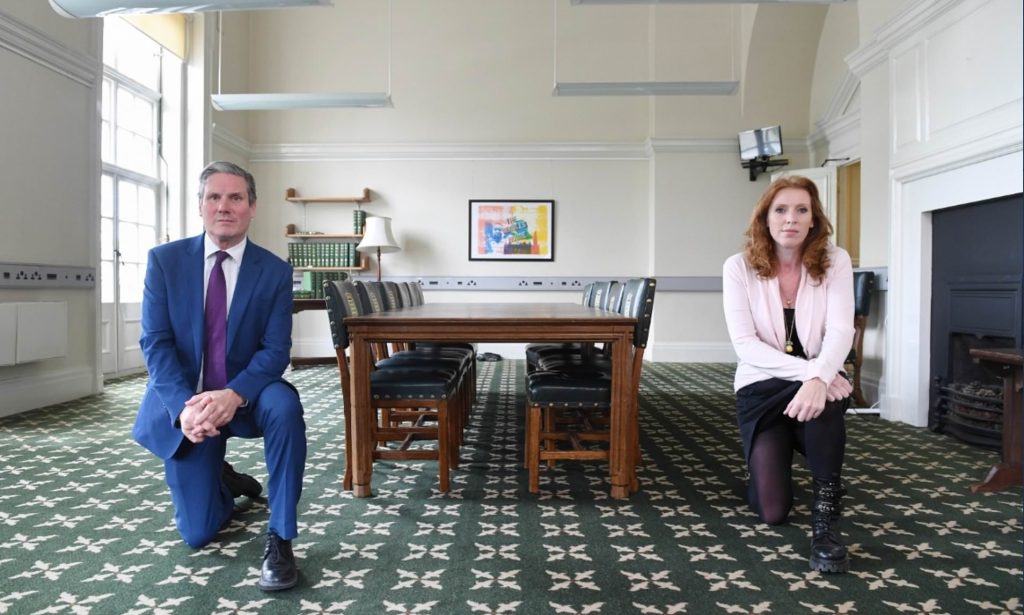
We’ve decided to create a permanent slot down here for woke gobbledegook. Today, the news that the “thin blue line” has been cancelled by the University of Madison-Wisconsin Police Department. The Kansas City Star has the story:
Created as a pro-cop symbol, “thin blue line” imagery can be found hanging from the walls of police stations, waving from front yard flagpoles, and stuck to car bumpers – but they won’t be found at the University of Madison-Wisconsin Police Department.
Whatever the white, black and blue flag might mean to some, it evokes “fear and mistrust” in Chief Kristen Roman’s community, she said. It’s one reason among several that she’s decided to ban it.
The term “thin blue line” has been around for decades, but the flag itself is much newer, coming to prominence alongside the Blue Lives Matter movement, which was established in response to Black Lives Matter, according to The San Diego Union-Tribune. As such, some view the flag as symbolizing a movement that exists in opposition to BLM and its goals of achieving social justice and eliminating racism in policing.
“Effective immediately, visible public displays of thin blue line imagery while operating in an official capacity are disallowed,” Roman wrote in an email to officers on January 15th, but released to the public this week.
The move comes after community backlash against the department for a November social media post in which a “thin blue line” flag can be seen displayed at the police station. Student activists also called on the department to remove the flag, outlets reported.
But the January 6th Capitol riot in Washington, D.C., was Roman’s tipping point, the email says. Watching the chaos and violence unfolding on the news, it wasn’t hard to spot a few familiar flags carried in the fray.
Though they likely didn’t know it at the time, police at the Capitol were facing off against fellow officers from communities around the country who had joined in with the rest of the rioters, McClatchy News previously reported.
Worth reading in full.
Stop Press: From the you-couldn’t-make-it-up department: Black Lives Matter has been nominated for a Nobel Peace Prize.
Stop Press 2: Woke politics is screwing up the vaccination programme, says Brendan O’Neill in Spiked-Online
Stop Press 3: Ed West, in Unherd, says that the Government’s new anti-woke campaign in defence of street names and statues is a distraction from the truly dangerous ideas that lurk behind woke orthodoxy.
“Mask Exempt” Lanyards
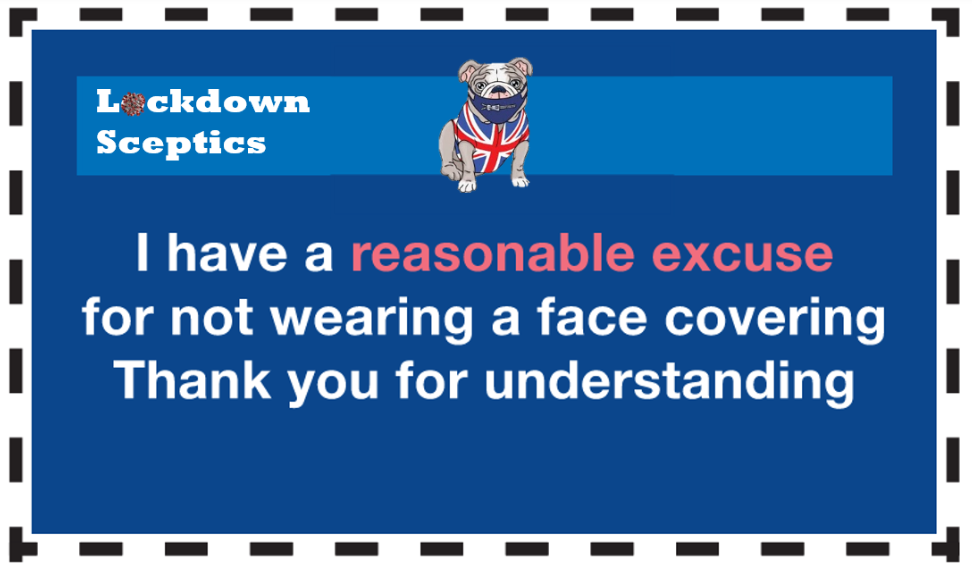
We’ve created a one-stop shop down here for people who want to obtain a “Mask Exempt” lanyard/card – because wearing a mask causes them “severe distress”, for instance. You can print out and laminate a fairly standard one for free here and the Government has instructions on how to download an official “Mask Exempt” notice to put on your phone here. And if you feel obliged to wear a mask but want to signal your disapproval of having to do so, you can get a “sexy world” mask with the Swedish flag on it here.
Don’t forget to sign the petition on the UK Government’s petitions website calling for an end to mandatory face masks in shops here.
A reader has started a website that contains some useful guidance about how you can claim legal exemption. Another reader has created an Android app which displays “I am exempt from wearing a face mask” on your phone. Only 99p.
If you’re a shop owner and you want to let your customers know you will not be insisting on face masks or asking them what their reasons for exemption are, you can download a friendly sign to stick in your window here.
And here’s an excellent piece about the ineffectiveness of masks by a Roger W. Koops, who has a doctorate in organic chemistry. See also the Swiss Doctor’s thorough review of the scientific evidence here and Prof Carl Heneghan and Dr Tom Jefferson’s Spectator article about the Danish mask study here.
Stop Press: MailOnline has a report on the SAGE recommendation that face masks be worn “in a wider range of settings where people could be asymptomatic and may be in close proximity… This may include outdoor spaces where it is difficult to maintain distance and people may be close together for extended periods (medium confidence).”
The Great Barrington Declaration
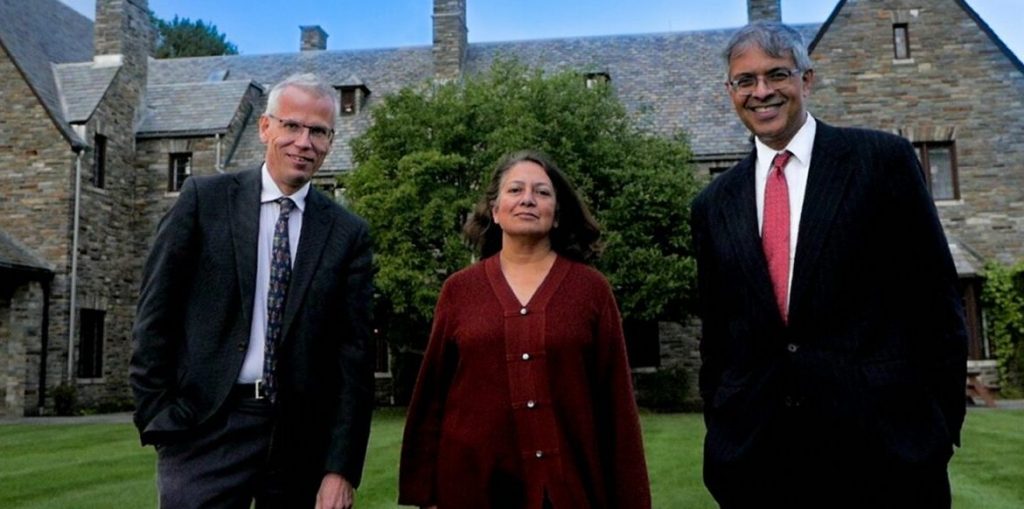
The Great Barrington Declaration, a petition started by Professor Martin Kulldorff, Professor Sunetra Gupta and Professor Jay Bhattacharya calling for a strategy of “Focused Protection” (protect the elderly and the vulnerable and let everyone else get on with life), was launched in October and the lockdown zealots have been doing their best to discredit it ever since. If you googled it a week after launch, the top hits were three smear pieces from the Guardian, including: “Herd immunity letter signed by fake experts including ‘Dr Johnny Bananas’.” (Freddie Sayers at UnHerd warned us about this the day before it appeared.) On the bright side, Google UK has stopped shadow banning it, so the actual Declaration now tops the search results – and Toby’s Spectator piece about the attempt to suppress it is among the top hits – although discussion of it has been censored by Reddit. The reason the zealots hate it, of course, is that it gives the lie to their claim that “the science” only supports their strategy. These three scientists are every bit as eminent – more eminent – than the pro-lockdown fanatics so expect no let up in the attacks. (Wikipedia has also done a smear job.)
You can find it here. Please sign it. Now over three quarters of a million signatures.
Update: The authors of the GBD have expanded the FAQs to deal with some of the arguments and smears that have been made against their proposal. Worth reading in full.
Update 2: Many of the signatories of the Great Barrington Declaration are involved with new UK anti-lockdown campaign Recovery. Find out more and join here.
Update 3: You can watch Sunetra Gupta set out the case for “Focused Protection” here and Jay Bhattacharya make it here.
Update 4: The three GBD authors plus Prof Carl Heneghan of CEBM have launched a new website collateralglobal.org, “a global repository for research into the collateral effects of the COVID-19 lockdown measures”. Follow Collateral Global on Twitter here. Sign up to the newsletter here.
Judicial Reviews Against the Government
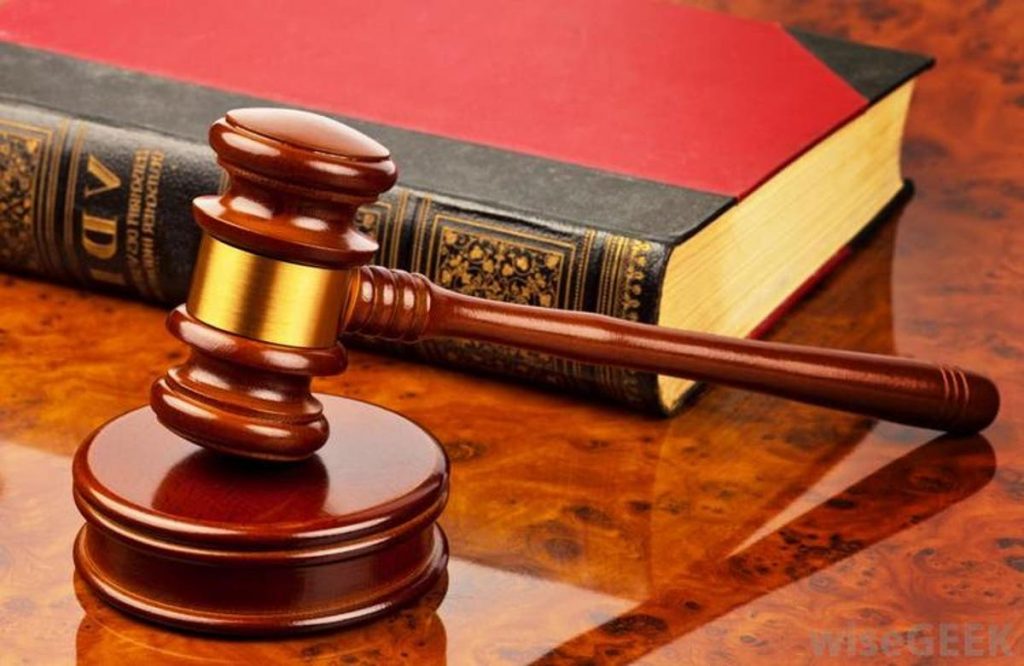
There are now so many legal cases being brought against the Government and its ministers we thought we’d include them all in one place down here.
The Simon Dolan case has now reached the end of the road. The current lead case is the Robin Tilbrook case which challenges whether the Lockdown Regulations are constitutional. You can read about that and contribute here.
Then there’s John’s Campaign which is focused specifically on care homes. Find out more about that here.
There’s the GoodLawProject and Runnymede Trust’s Judicial Review of the Government’s award of lucrative PPE contracts to various private companies. You can find out more about that here and contribute to the crowdfunder here.
There’s the class action lawsuit being brought by Dr Reiner Fuellmich and his team in various countries against “the manufacturers and sellers of the defective product, PCR tests”. Dr Fuellmich explains the lawsuit in this video. Dr Fuellmich has also served cease and desist papers on Professor Christian Drosten, co-author of the Corman-Drosten paper which underpins the SARS-CoV-2 PCR test protocol. That paper was submitted on January 21st and accepted following peer review on January 22nd. The paper has been critically reviewed here by Pieter Borger and colleagues, who have also submitted a retraction request.
And last but not least there was the Free Speech Union‘s challenge to Ofcom over its ‘coronavirus guidance’. A High Court judge refused permission for the FSU’s judicial review on December 9th and the FSU has decided not to appeal the decision because Ofcom has conceded most of the points it was making. Check here for details.
Stop Press: A group of Scottish Church leaders from various denominations have now launched their claim for judicial review over the decision by the Scottish ministers to close churches during the current lockdown. The group, which is supported by the Christian Legal centre, claims that the closures exclude the vulnerable who don’t have access to the online broadcasts, that they are unconstitutional, and that they are illogical – how can it be that church buildings can safely be used for blood donor sessions and food banks but not public worship?
Samaritans

If you are struggling to cope, please call Samaritans for free on 116 123 (UK and ROI), email jo@samaritans.org or visit the Samaritans website to find details of your nearest branch. Samaritans is available round the clock, every single day of the year, providing a safe place for anyone struggling to cope, whoever they are, however they feel, whatever life has done to them.
Shameless Begging Bit
Thanks as always to those of you who made a donation in the past 24 hours to pay for the upkeep of this site. Doing these daily updates is hard work (although we have help from lots of people, mainly in the form of readers sending us stories and links). If you feel like donating, please click here. And if you want to flag up any stories or links we should include in future updates, email us here. (Don’t assume we’ll pick them up in the comments.)
And Finally…
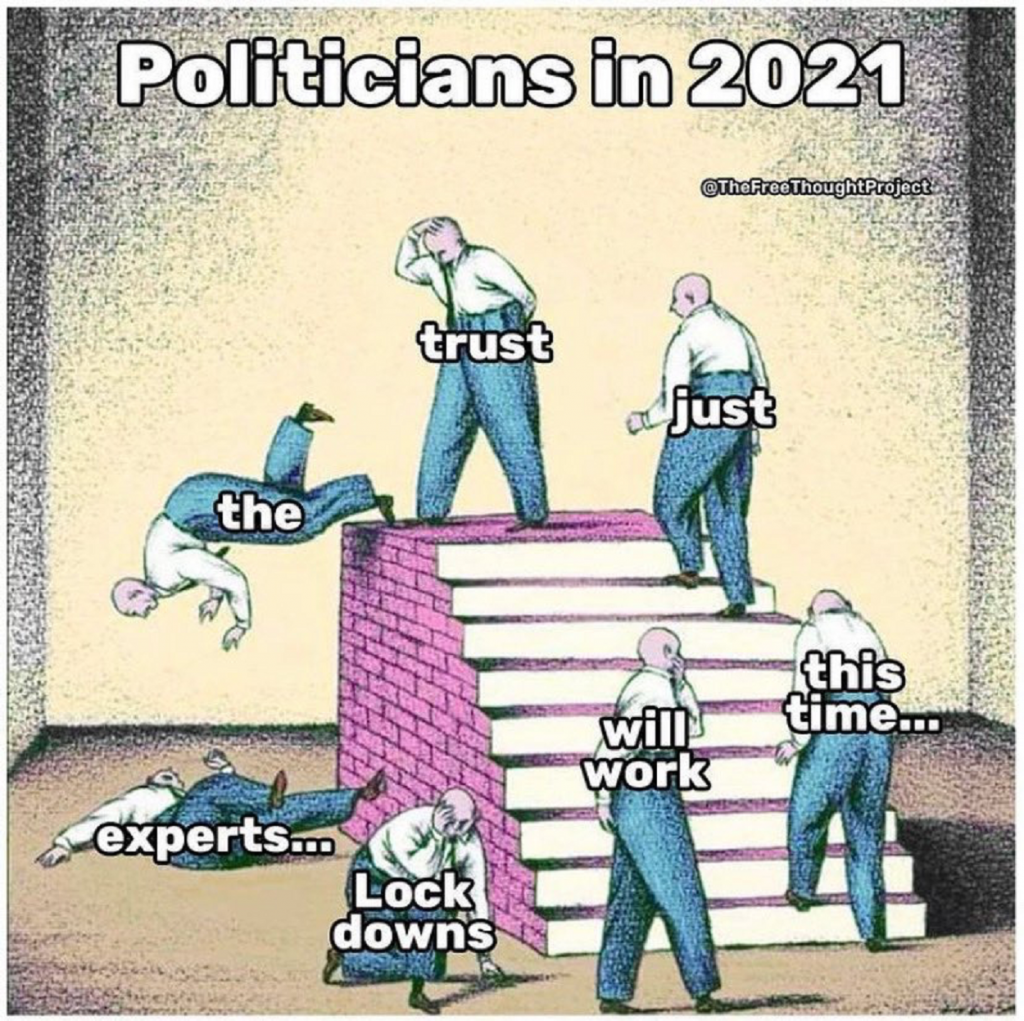
 Important changes to lockdown/self-isolation regulations from 5pm
Important changes to lockdown/self-isolation regulations from 5pm












To join in with the discussion please make a donation to The Daily Sceptic.
Profanity and abuse will be removed and may lead to a permanent ban.